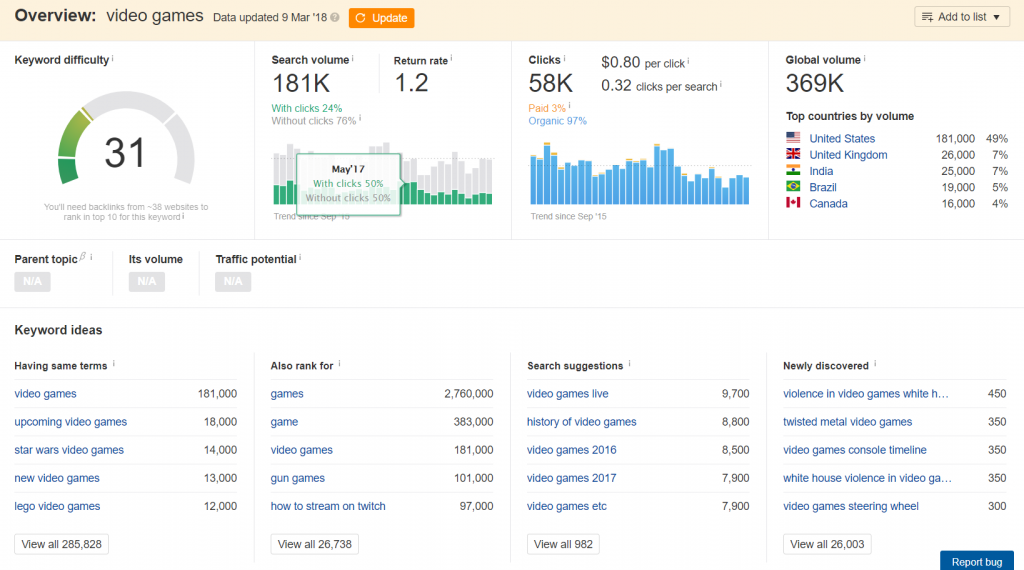How Keywords have Changed in 2018
Keyword research is one of the fundamental SEO practices and is usually the starting point of almost every important SEO strategy. The process of picking the right keywords for a website has been somewhat very simple and familiar over the past few years and involves simply entering a series of keywords and take a look at how statistically viable it would be, along with being relevant to what the website offers.
However, with all of the updates that have been rolling out over the past year and the last few months, keyword research is looking to experience the most amount of changes this 2018. While most of the process remains the same, there is a good number of new elements that come into play which make the once simple process into something more elaborate than before.
With new algorithm updates, along with the Google’s increased focus on mobile SERPs and ranking factors, it is no surprise that keywords and keyword research have changed this 2018. Let us take a look at these changes and see how we can optimize tried and tested techniques and strategies.
The rise of voice search
Voice search and AI assistant have been around for a good number of years now, with the latest editions becoming more refined and complex than the earlier incarnations. While voice recognition software is still at its early growth, it is still apparent that voice search would be an important part of SEO in the near future.
We have written about how voice search can help impact your SEO this 2018, and making use of it on inquiry related and exact search terms has the potential to get your webpage on top of search results. This process is further aided by Google’s Hummingbird update, which increased the focus on semantic search results and encourages phrased search terms.
With AI assistants like Google Assistant, Alexa, Siri, and Bixby becoming a regular fixture in daily life, it would not be surprising to see voice search becoming an important pillar in your website’s SEO Strategy.
Mobile-first approach to search
Mobile optimization has been the name of the game for most websites due to the increasing number of internet users accessing websites through their mobile devices. With updates like Google Speed, along with the increased integration of AMP into websites, optimizing your website for mobile is the best way to keep your website traffic steady, while also future-proofing it.
If your website has not been optimized for mobile, we have a mobile optimization checklist that will guide you on what you need to do. This includes AMP plugin integration, loading speed optimization, and applying the responsive design. With more mobile-focused updates coming in the next few months integrating these features would help improve your website’s overall performance.
Focusing on the niche topic
When it comes to keyword research, the first thing that people regularly do is to open your keyword research tool, type a keyword related you the website that you are working on, and see how well it performs, and then use it when creating content. As straightforward as that process may be, this has become the standard process for a good amount of time.
However, this process is being done by a lot of people, which means that you will all be getting similar results, which means tougher competition. While it may be unavoidable to have similar keywords to your competition, there are times that your search results would not yield the best results that users would look for.
For example, entering a keyword on a tool like Ahrefs will only yield the most similar results. This is good when you are looking for primary keywords, but if you want more searchability, adding secondary or using niche keywords would help bring you traffic that you would not have received with standard keywords.
For example, when you enter the keyword “video games”, which has good search volume, you would also be able to view options such as “upcoming video games” or “new video games”. While these may be viable options, it is best to look into more options. Using Ahrefs, I also saw video game-related search terms that can fit audience interests and respond to inquiries such as “how to stream on twitch” or best gaming consoles”.
In a time where there is an abundance of choice, finding your niche can be that crucial factor in boosting your traffic. With the increasing focus on semantics, using exact keywords might become a thing of the past, and adjusting our keywords into phrased search results might become the new standard in the near future.
What this means
Keywords and keyword research in 2018 have taken new steps that change the standard process of looking for keywords that you can rank in search results. With Google improving its ability to understand phrases and questions, search looks to become much smarter than before. While it may be too drastic to immediately shift your focus and prioritize exact keywords less, it is best to do some experimenting, and dip your feet in the water to see how it would perform.
SEO is evolving at a rapid pace over the past few months and being able to adjust your techniques and strategies to accommodate new and fresh ideas and concepts will bode well for your future.
Key Takeaway
While keywords are still a fundamental element in SEO, changes are bound to happen in the near future. 2018 is a big year where we have been seeing numerous updates and changes in Google’s algorithm and ranking metrics, and it looks like more are coming their way. SEO is an ever-changing game, and keeping up with the trend is the best way to keep your website relevant and visible.
If you have questions and inquiries about SEO and keyword research, leave a comment below and let’s talk.


